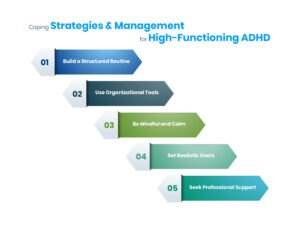High functioning ADHD describes people who exhibit the signs and symptoms of attention-deficit/hyperactivity disorder and yet lead successful academic, career, or day-to-day living. Those people tend to work out effective coping mechanisms that conceal the problems, making the condition harder to detect. Therefore, they may be hit by inner difficulties such as restlessness, lack of concentration, and mental fatigue.
The success that will result in burnout, unless it is overcome, is that high performance, as shown in ADHD, takes its toll on the burnout due to the continual stress of performing at high levels. It is beneficial to know its signs to offer the appropriate support and strategies to achieve success in the long run and stay emotionally healthy.
What Is High-Functioning ADHD?
High functioning ADHD is a form of attention-deficit/hyperactivity disorder where a person has such symptoms as the inability to focus, hyperactivity, or impulsivity. Still, it can be productive in everyday life, in school, or even at the workplace. High-functioning ADHD individuals tend to create ways of covering up their condition so that no one can suspect they are victims of the ADHD condition.
You can conceal your plights very well to the extent that people are not aware. You bother yourself to work on time and keep up appearances. Therefore, you can even work harder than others to attain the same. You get distracted easily, but you drag yourself up once more. Hence, you may always overestimate and be too organized, or you may be busy at all times. This makes you grow potent coping skills at the expense of your energy.
High-Functioning ADHD Symptoms
The following are the signs of high functioning ADHD:
- Difficulty in staying concentrated on a single activity.
- Loss of little details or routines.
- Unquiet or not able to stay still.
- Easily distracted and even in significant tasks.
- Getting into numerous projects but failing to complete them.
- Hurrying up the job and committing petty errors.
- Worn out or anxious to work harder to stay on.
- Frequently stressed or frightened, even though he looks calm.
What Is The 24-Hour Rule For ADHD?
The 24-hour rule for ADHD implies that you should allow yourself a complete day before making a final decision or responding to something large. Individuals who experience ADHD can be quick to react to feelings or thoughts. Delaying 24 hours makes you think clearly and not take fast decisions that you may regret. It allows you time to think your situation through and view it from new perspectives.
The rule can assist in controlling emotions and making decisions. You have the opportunity to rest at this time, have a relaxing activity, or concentrate on a different activity. The following day, you tend to view things more peacefully and make more intelligent and well-balanced decisions. It is an easy method of delaying impulsive activities.
High Functioning ADHD in Adults
Adults who have ADHD are high functioning, manage activities daily, work, and their relationships, but they still display deficiencies in concentration, organization, or impulsivity. It may seem to you that you are performing well and that you already have an upper hand over others, but in the backyard, you realize that you have an extra mile to go to stay at pace. Reminders, planners, and routines can be counted on to keep track.
High-functioning adult ADHD learners learned coping skills as children, just as high-functioning ADHD child learners learn to conceal their plight in school. Nevertheless, such regular intense work can be exhausting, and thus you will want to find an escape or remedies that will allow you to cope with energy and sanity.
High-Functioning ADHD Woman
When a woman has high-functioning ADHD, you can be quite a secretive lot about your problems, and nobody can take much notice of it. You might be experiencing a mental workload, and you find racing thoughts because you have to balance between work, family, and other personal obligations. You grind out day upon day and apply your willpower to make your conditions look better with a grin that tells another person you are doing well. Nevertheless, you keep going and going to deliver to the expectations and not to disappoint people, even when you are so tired.
In contrast to the typecast ADHD image, you can express your difficulties in insidious ways. You may forget, procrastinate, or lose track, but you justify it through perfectionism and people-pleasing. You can work late to get work finished, check and recheck, and overpromise yourself that you will manage it all. This is relentless activity in trying to keep up with it, and it can be exhausting to your energy as well as to your psychological state.
Coping Strategies & Management for High-Functioning ADHD

Build a Structured Routine
A routine causes one to remain concentrated and not so distracted. Plan your time and have time to work, eat, and sleep. Have a diary or a timetable so that you do not miss out on tasks and deadlines. Rise and sleep regularly. The symptoms are easier to handle with such a structure.
Use Organizational Tools
You can use organizational aids like planners, reminder applications, sticky notes, and others to remember the important stuff. They can be prioritized in color-coded form. Having a clean workspace, you will not be distracted. Large tasks should be broken down and reduced to small, manageable bits. These will help you stay concentrated and see to it that you get things done in time.
Be Mindful and Calm
Mindfulness will assist in the current moment, and mindfulness of what you are thinking and taking action. The most basic of breathing exercises can relax you when in a stressful state. Yoga and meditation benefit focus. It can refresh you to take brief breaks in the work process. These habits make the brain less nervous and clearer.
Set Realistic Goals
It is less daunting when small, clear goals are set. Divide large undertakings into smaller steps that have dates. Be happy about little achievements to be motivated. Do not create unrealistic expectations that can bring about frustrations. This strategy can make you work without exhaustion.
Seek Professional Support
An ADHD coach or a therapist will assist you in managing the symptoms. The drug can be used to enhance concentration and decrease impulsivity. Support groups allow you to express your experiences and be instructed by others. Professional advice guarantees you the best strategies for your needs. This assistance renders life easier.
High-Functioning ADHD Test and Diagnosis
High-functioning ADHD testing is used to determine whether your symptoms fit into the conditions of ADHD. The extent of interrogation to be asked by a doctor or mental health professional will include your customary everyday activity, performance at school or at work, as well as your previous medical history. They can also have a conversation with your family or close friends to know more about your behavior. This is aimed at identifying patterns to indicate signs of ADHD without other illnesses. Early diagnosis can assist you in getting the appropriate support and treatment.
- Typical Protocols in testing and diagnosis.
- Responding to questionnaires on your focus, mood, and habits.
- Interviews with a doctor, psychologist, or psychiatrist.
- Checking in with your personal and family medical history.
- Obsessing on a learning or mood disorder that can influence focus.
- Symptom measurement with ADHD rating scales.
High Functioning ADHD Treatment Options
Medication Management
ADHD is a medication doctors use to help manage symptoms such as inattention and impulsiveness. These drugs can make you more focused and easier to accomplish tasks. The most popular is the stimulant type; however, non-stimulants do exist. The optimal medication that fits your needs and health will be selected by your doctor. Follow-ups will be used in order to make necessary alterations in dosage and check progress.
Cognitive Behavior Therapy (CBT)
CBT educates you on how to handle bad thinking and form healthy behaviors. It is problem-oriented and aims at establishing emotional control. In this regard, therapists put you through the process of breaking large tasks into small and manageable ones.
Coaching and Skill Training
Attention Deficit Hyperactivity Disorder coaches are with you as you develop a life routine and strategies. They assist in time management, organization, and the possibility of setting realistic goals. You are given customized plans considering your strengths and hurdles. Team coaching is able to enhance productivity at work and at home. It also promotes accountability to be on track.
Lifestyle Changes
Simple habits can help AHD to a large extent on a day-to-day basis. Working out helps people to be focused and less restless. Balanced food and sleep are healthy habits that help the brain work well. Single usages of the screen may be reduced, which may enhance productivity. Mental clarity can be a part of long-term benefits created by small lifestyle changes.
End Note
Treatment for high-functioning ADHD focuses on how to control the symptoms and, at the same time, make individuals utilize their strengths appropriately. Focus, productivity, and emotional balance can be enhanced by a mixture of medication, treatment, lifestyle modification, and skill training. Education and support groups are also important and contribute to the development of confidence and decreasing the sensation of isolation.
Through proper strategy, people can succeed in their personal and professional lives. We guide you to resources and reliable information that will help you select the most suitable treatment plan at Mental Behavioral. We will help you on your path to improved mental health, improved relationships, and a more balanced lifestyle. Having appropriate equipment makes it more helpful and enjoyable to live with high-functioning ADHD.
FAQs
What is high-functioning ADHD like?
High-functioning ADHD often involves challenges with focus, impulsivity, and time management, but individuals still manage daily life, school, or work responsibilities. They usually develop coping strategies to mask their symptoms. However, the constant effort can lead to mental fatigue and stress.
What is the difference between high-functioning ADHD and normal ADHD?
The main difference is that high-functioning ADHD symptoms are less disruptive to daily life. People with high-functioning ADHD often appear organized and successful, but they may struggle internally. Normal ADHD symptoms are more visible and can significantly interfere with daily functioning.
Are high functioning ADHD more prevalent in children or adults?
It may happen in either, although in many cases, it is seen in adults due to the fact that they have already established coping skills throughout their years. The symptoms may be confused with the personality quirks in children. The struggles may come across adults in terms of work, organization, or time management.
Does high-level ADHD influence the relationships?
Yes, it can influence relationships, communication, emotional control, and attention. Partners will wrongly interpret forgetfulness or loss of attention as indifference. Relationships can survive with wisdom and plans.








